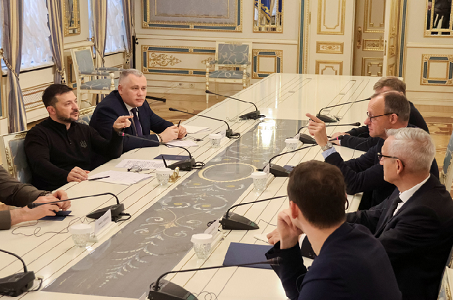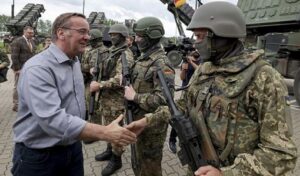Ukrainian President Volodymyr Zelensky has recently emphasized the need for a diplomatic resolution to the ongoing war with Russia, suggesting the potential deployment of foreign troops in Ukraine until it achieves NATO membership. During a joint press conference with German opposition leader Friedrich Merz on December 9, 2024, Zelensky stated, “Ukraine wants this war to end more than anyone else. No doubt, a diplomatic resolution would save more lives”.
Key Points from Zelensky’s Statements:
- Diplomatic Resolution: Zelensky expressed that Ukraine seeks a diplomatic end to the conflict, highlighting the urgent need to save lives and stabilize the situation in the region
- Foreign Troop Deployment: He proposed that a contingent of foreign military forces could be stationed in Ukraine as a temporary measure until the country secures NATO membership. This idea reflects an increasing openness to negotiations amid ongoing hostilities.
- Security Guarantees: Zelensky underscored the importance of obtaining clear timelines regarding Ukraine’s accession to both NATO and the European Union, asserting that these guarantees are crucial for preventing future aggression from Russia.
- Context of Negotiations: His remarks come at a time when discussions about peace settlements are gaining traction, particularly with the anticipated return of Donald Trump to the U.S. presidency. Trump has indicated a desire for rapid negotiations to end the conflict.
Zelensky’s comments signify a strategic shift in Ukraine’s approach to the war, as he balances military strength with diplomatic efforts to ensure long-term security for his nation.
What are the main obstacles to achieving a diplomatic resolution in Ukraine
Achieving a diplomatic resolution to the ongoing conflict in Ukraine faces several significant obstacles, rooted in both the positions of the parties involved and the broader geopolitical context. Here are the main challenges:
Key Obstacles to Diplomacy
- Extreme Demands from Russia: Russia’s demands are perceived as excessive by Ukraine, including calls for territorial concessions and changes in Ukrainian leadership. Ukraine is unwilling to accept these terms, which makes negotiations difficult. Both sides currently prefer to continue fighting rather than compromise on their core demands, leading to a stalemate where neither party sees a viable path to peace without significant concessions from the other.
- Mutual Distrust: There is profound distrust between Ukraine and Russia, exacerbated by historical grievances and ongoing military actions. Ukraine views any negotiations with the current Russian government as futile, believing that Russia’s imperial ambitions cannot be appeased without significant changes in its political structure. This lack of trust hampers any potential for meaningful dialogue.
- Internal Political Pressures: Both governments face strong domestic opposition to any form of compromise. In Ukraine, there are large constituencies that oppose concessions to Russia, and any perceived weakness could undermine the current leadership. Similarly, Russian leadership is insulated from public dissent and has little incentive to moderate its demands due to its ideological commitment to subjugating Ukraine.
- Legal and Constitutional Issues: The legal frameworks governing territorial integrity pose significant challenges. Both countries claim rights over disputed territories based on their constitutions, complicating any potential “land for peace” agreements. Such legal entanglements make it difficult to find a mutually acceptable solution.
- Geopolitical Considerations: The broader international context also plays a role in hindering negotiations. The West’s support for Ukraine complicates Russia’s position, as Moscow seeks to undermine this support while also avoiding a scenario that could lead to a stronger NATO presence in Eastern Europe. This geopolitical dynamic influences both sides’ willingness to engage in diplomacy.
- Cultural and Identity Issues: The war has significantly altered Ukrainian identity and perceptions of Russia among Ukrainians, especially among Russian speakers who have been affected by the conflict. This shift complicates any diplomatic efforts, as many Ukrainians now view Russia not just as an aggressor but as a threat to their national identity.
- Lack of Willingness from Russia: Ultimately, there is a prevailing belief that Russia is not genuinely interested in peace negotiations but instead uses diplomatic overtures as a tactic to gain strategic advantages or weaken international support for Ukraine.This perception further diminishes the likelihood of successful negotiations.
These obstacles create a complex landscape for diplomacy in Ukraine, making it challenging for both sides to envision a resolution that meets their fundamental needs while ensuring long-term stability in the region.
What role could the EU play in facilitating a peace agreement in Ukraine
The European Union (EU) can play a crucial role in facilitating a peace agreement in Ukraine through several strategic actions. Here are the main avenues through which the EU could influence the peace process:
Key Roles for the EU
- Diplomatic Support: The EU can act as a mediator in negotiations, leveraging its relationships with both Ukraine and Russia. By hosting talks and providing a neutral platform for discussions, the EU can help bridge gaps between conflicting parties and promote dialogue that respects international norms and Ukraine’s sovereignty.
- Military and Economic Assistance: Continued military support for Ukraine is essential, as it strengthens Ukraine’s position in negotiations. The EU can enhance its military assistance programs and provide economic incentives to bolster Ukraine’s defense capabilities while simultaneously preparing it for future integration into EU structures. This dual approach reinforces Ukraine’s bargaining power.
- Security Guarantees: The EU can work towards establishing a framework of security guarantees for Ukraine, potentially in collaboration with NATO and other international partners. These guarantees would be critical for ensuring a stable and lasting peace, addressing both immediate security concerns and long-term stability.
- Post-Conflict Reconstruction: The EU should prepare to lead efforts in Ukraine’s economic reconstruction post-conflict. This includes financial aid, infrastructure rebuilding, and support for political stabilization initiatives, which would help solidify peace by addressing the root causes of conflict and fostering economic resilience.
- Engagement with International Partners: The EU can coordinate with other global players, such as the United States, to create a comprehensive approach to peace that includes not only bilateral agreements but also multilateral frameworks involving various stakeholders. This approach would enhance the legitimacy and effectiveness of any peace agreement reached.
- Monitoring and Verification Mechanisms: The EU can support or establish monitoring mechanisms to ensure compliance with any ceasefire or peace agreement. This could involve collaboration with organizations like the OSCE to provide unbiased oversight of the situation on the ground, helping to build trust between the parties involved.
- Promoting Political Reforms: Encouraging democratic reforms within Ukraine can also be part of the EU’s strategy. A stable, democratic Ukraine is less likely to fall back into conflict and more likely to align with European values, making it a stronger candidate for EU membership in the future.
By leveraging these roles, the EU can significantly influence the trajectory of peace negotiations in Ukraine, advocating for solutions that uphold international law while addressing the security needs of both Ukraine and Europe as a whole.







